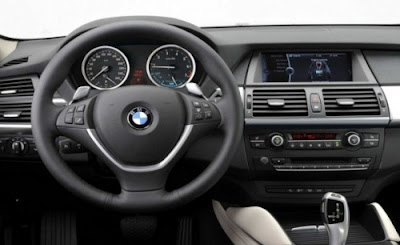2012 BMW X6 was introduced and will be available in spring 2012. For the fog lamps and ornate around the trunks of a redesigned grille. In the segment, X6 became the first automaker to adopt adaptive LED headlamps. Taillight underwent a redesign, with LED technology.
BMW X6 will be offered with a choice of 2 color and 8 non-metallic metallic (including metallic Marrakech Brown, Orion Silver metallic and Midnight Blue metallic).
Compared with the concept, very little has changed. In fact, you'll have a hard time noticing any differences at all. The only obvious design tweak was made to the crossover's side windows. On the concept, the B- and C-pillars are not visible, but on the production car they clearly divide up the glass.
Even the X6's complex front fender design made it to production. Each front quarter panel surrounds the entire headlamp, creating a very seamless appearance. The X6's aggressive front fascia is also carried over from the concept, with its large air intakes and stylish fog lamps.
Daring design
The X6's roofline begins arching downward after the B-pillar and continues plunging right to the X6's rising waistline. As a result, second-row headroom and rear cargo volume are both compromised.
The new X6 is longer and lower than the new X5, seating only four. But what the sporty X6 loses in seating and storage, it gains in performance.
Compared to the X5, the X6 has almost an inch of additional wheelbase length, and two inches of added width. The overall height of the X6 is a whopping 3.3 inches lower than that of the X5.
All-new twin-turbocharged V8
The range-topping X6 xDrive50i is propelled by an all-new twin-turbo 4.4-liter V8 unit producing 400 horsepower at 5500 rpm and 446 pound-feet of torque between 1750 rpm and 4500 rpm. The sprint to 62 mph takes just 5.4 seconds and fuel economy is estimated at around 19 mpg (U.S. gallons).
The engine is designed as a replacement to the company's current 4.8-liter naturally-aspirated V8. It is expected to filter into other models like the 5-Series, 6-Series and 7-Series in the near future.
The engine seems to represent the second stage in a shift at BMW from high-displacement naturally-aspirated motors to slightly smaller turbocharged powerplants. BMW's twin-turbo 3.0-liter engine that powers the 335i and 135i has been met with overwhelmingly positive reviews, and it appears BMW is hoping for similar results with its new V8.
The X6's other engine is also a twin-turbo setup. The xDrive35i comes with the aforementioned 3.0-liter inline-six from the 335i, producing 300 horsepower.




